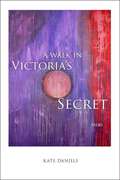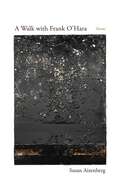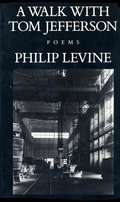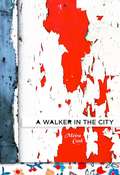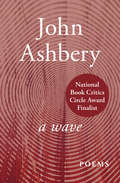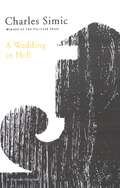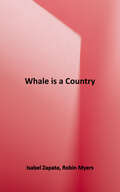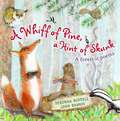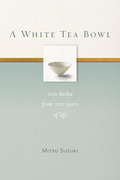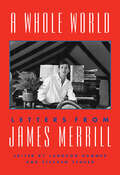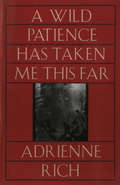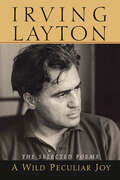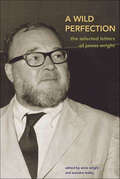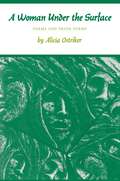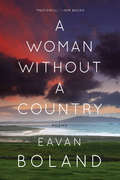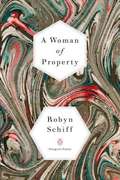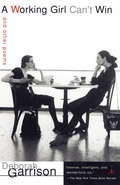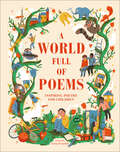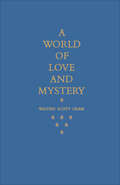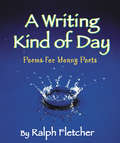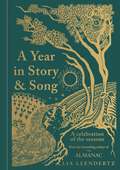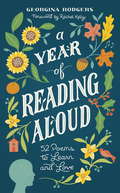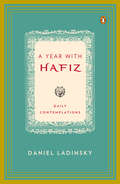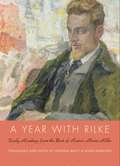- Table View
- List View
A Walk in Victoria's Secret: Poems (Southern Messenger Poets)
by Kate DanielsWith A Walk in Victoria’s Secret, Kate Daniels crafts a bold, brassy, yet delicate vision of a woman’s growth. Imbued with a unique poetic voice that is utterly feminist, these poems possess a fiery intensity for those abuses no woman can ever quite recover from, but also reveal the loving, forgiving temperament of the mother no woman can do without. From the title poem’s unapologetic celebration of the breast to a belated apology to the girl who integrated her elementary school, to the awkward juxtaposition of elderly and young women in a gynecologist’s office on September 11, 2001, Daniels provides a rich array of meditations on what it means to be a woman in our time. Buoyant and entertaining, singular in style, and exuberant in language, A Walk in Victoria’s Secret offers an intimate look at women’s experiences.
A Walk with Frank O'Hara: Poems (Mary Burritt Christiansen Poetry Series)
by Susan AizenbergSusan Aizenberg uses a range of techniques in her newest collection of poetry to explore contemporary daily life in a difficult world. She critiques gender, grief, culture, and the myriad experiences that define us. But even when grappling with old wounds, a strain of romance runs throughout the book, reminding readers that it&’s between the love and the grief that we&’ll find the moments worth being shared and savored.
A Walker in the City
by Méira CookShortlisted for the 2012 Aqua Lansdowne Prize for Poetry A fascinating, ambling, loitering mystery story in verse, a whoizzit rather than a whodunit. In this innovative and arresting narrative poem, Méira Cook's walker, a young woman, is a character being written by an "old city poet," who is in turn being written by another poet, for whom the young woman, "Ms. Em Cook," has been an amanuensis. Always witty and often hilarious, feather-light in touch, the book is an entertaining exploration of serious issues: youth and age; life, death and rebirth; the (dis)connection of language and reality; tradition and the now. It is an assemblage of seven nesting sections, each of them a sort of chapbook speaking to each of the others and rounding out a long poem of great freshness. A Walker in the City is one of a kind, one of the most original books Brick has ever published.
A Wave: Poems
by John AshberyOne of Ashbery&’s most acclaimed and beloved collections since Self-Portrait in a Convex Mirror, filled with his signature wit and generous intelligenceThe poems in John Ashbery&’s award-winning 1984 collection A Wave address the impermanence of language, the nature of mortality, and the fluidity of consciousness—matters of life and death that in other hands might run the risk of sentimentality. For John Ashbery, however, these considerations provide an opportunity to display his prodigious poetic gifts: the unerring ear for our evolving modern language and its ever-expanding universe of meanings, the fierce eye trained on glimmers underwater, and the wry humor that runs through observations both surprising and familiar. As the poem &“The Path to the White Moon&” has it, &“We know what is coming, that we are moving / Dangerously and gracefully / Toward the resolution of time / Blurred but alive with many separate meanings / Inside this conversation.&” The long title poem of A Wave, which closes the book, is considered one of Ashbery&’s most distinguished works, praised by critic Helen Vendler for its &“genius for a free and accurate American rendition of very elusive inner feelings, and especially for transitive states between feelings.&” Winner of both the Lenore Marshall Poetry Prize and the Bollingen Prize, this book is one to be read, reread, and remembered.
A Wedding In Hell
by Charles SimicSimic puts chirping birds, sex, and happiness into a world of broken windows, shivering trees, soldiers, lone dogs, the homeless of the city, and a God still making up his mind. “Provocative...a tantalizing, beautiful fusion of visions” (Bloomsbury Review).
A Whale Is a Country
by Isabel ZapataThe debut English language poetry collection by noted Mexican author Isabel Zapata, A Whale is a Country explores humanity's relationship to the natural world through a multitude of poignant angles.
A Whiff of Pine, A Hint of Skunk: A Forest of Poems
by Deborah Ruddell Joan E. RankinIn a watery mirror the rugged raccoon admires his face by the light of the moon: the mysterious mask, the whiskers beneath, the sliver of cricket still stuck in his teeth. Take a lighthearted romp through four seasons in the forest with these whimsical poems. Marvel at the overachieving beaver, applaud the race-winning snail and its perfect trail of slime, or head off to be pampered at a squirrel spa. Warning: Deborah Ruddell's quirky cast of animal characters and Joan Rankin's deliciously daffy pictures will cause giggles. The woods have never been so much fun! Image descriptions present.
A White Tea Bowl
by Mitsu Suzuki Kate McCandlessA White Tea Bowl is a selection of 100 haiku written by Mitsu Suzuki, the widow of Shunryu Suzuki Roshi, and published in celebration of her 100th birthday. The compelling introduction by Zen priest Norman Fischer describes the profound impact on her life and work of war in Japan and social upheaval in America.Part I: 100 Haiku presents a kaleidoscope of poems by Mitsu Suzuki that touch all aspects of her being: her dedication to the Buddha way, the loneliness of a widow's life, her generational role as "Candy Auntie," her sensitive attunement to nature, and her moments of insight into the dharma. The more you read these haiku, the more their wisdom will emerge.Part II: Pickles and Tea contains reminiscences and anecdotes about Mitsu Suzuki by those who lived and studied with her at the San Francisco Zen Center; often these meetings took place in Mitsu's kitchen where she provided countless cups of tea, cookies, and homemade pickles as well as sage advice.
A Whole World: Letters from James Merrill
by James MerrillThe selected correspondence of the brilliant poet, one of the twentieth century's last great letter writers."I don't keep a journal, not after the first week," James Merrill asserted in a letter while on a trip around the world. "Letters have got to bear all the burden." A vivacious correspondent, whether abroad, where avid curiosity and fond memory frequently took him, or at home, he wrote eagerly and often, to family and lifelong friends, American and Greek lovers, confidants in literature and art about everything that mattered--aesthetics, opera and painting, housekeeping and cooking, the comedy of social life, the mysteries of the Ouija board and the spirit world, and psychological and moral dilemmas--in funny, dashing, unrevised missives, composed to entertain himself as well as his recipients. On a personal nemesis: "the ambivalence I live with. It worries me less and less. It becomes the very stuff of my art"; on a lunch for Wallace Stevens given by Blanche Knopf: "It had been decided by one and all that nothing but small talk would be allowed"; on romance in his late fifties: "I must stop acting like an orphan gobbling cookies in fear of the plate's being taken away"; on great books: "they burn us like radium, with their decisiveness, their terrible understanding of what happens." Merrill's daily chronicle of love and loss is unfettered, self-critical, full of good gossip, and attuned to the wicked irony, the poignant detail--a natural extension of the great poet's voice.
A Wild Patience Has Taken Me This Far: Poems 1978-1981
by Adrienne Rich"We are in the presence here of a major American poet whose voice at mid-century in her own life is increasingly marked by moral passion."--New York Times Book Review
A Wild Peculiar Joy: The Selected Poems
by Irving LaytonA Wild Peculiar Joy is Irving Layton's poetic testament. Hailed as the great lyric poet, Irving Layton has come to be known as one of Canada's most powerful, groundbreaking voices, an important and influential writer whose distinguished career spanned almost forty-five years. By turns passionate and grave, joyous and apocalyptic, his beautifully crafted poems are illuminated by a strong social and political conscience, and an intensely humanistic view of the world. This is poetry that is timeless and universal. Drawn from his entire body of work, and now reissued in this handsomely redesigned volume, this edition includes a new introduction by Sam Solecki, and selected short excerpts from Irving Layton's writings on the craft of poetry. A Wild Peculiar Joy once again makes available to readers the poetry of Irving Layton and stands as the author's definitive selected.
A Wild Perfection: The Selected Letters of James Wright
by James WrightThe life and work of a major American poet described in his own words."There is something about the very form and occasion of a letter--the possibility it offers, the chance to be as open and tentative and uncertain as one likes and also the chance to formulate certain ideas, very precisely--if one is lucky in one's thoughts," wrote James Wright, one of the great lyric poets of the last century, in a letter to a friend. A Wild Perfection is a compelling collection that captures the exhilarating and moving correspondence between Wright and his many friends. In letters to fellow poets Donald Hall, Theodore Roethke, Galway Kinnell, James Dickey, Mary Oliver, and Robert Bly, Wright explored subjects from his creative process to his struggles with depression and illness.A bright thread of wit, gallantry, and passion for describing his travels and his beloved natural world runs through these letters, which begin in 1946 in Martin's Ferry, Ohio, the hometown he would memorialize in verse, and end in New York City, where he lived for the last fourteen years of his life. Selected Letters is no less than an epistolary chronicle of a significant part of the midcentury American poetry renaissance, as well as the clearest biographical picture now available of a major American poet.
A Woman Under the Surface: Poems and Prose Poems (Princeton Series of Contemporary Poets #162)
by Alicia OstrikerFrom A Woman Under the Surface:MOON AND EARTH Alicia Ostriker ? Of one substance, of oneMatter, they have cruellyBroken apart. They never will touch Each other again. The shiningLovelier and youngerTurns away, a pitiful girl. She is completely nakedAnd it hurts. The largerMotherly one, breathlessly luminous Emerald, and blue, and whiteTraveling mists, suffersBirth and death, birth and death, and the shockOf internal heat killed by external cold.They are dancing through that blackness. They press as ifTo come closer.
A Woman Without a Country: Poems
by Eavan BolandA powerful work that examines how--even without country or settled identity--a legacy of love can endure. Eavan Boland is considered "one of the finest and boldest poets of the last half century" by Poetry Review. This stunning new collection, A Woman Without a Country, looks at how we construct one another and how nationhood and history can weave through, reflect, and define the life of an individual. Themes of mother, daughter, and generation echo throughout these extraordinary poems, as they examine how--even without country or settled identity--a legacy of love can endure. From "Talking to my Daughter Late at Night" We have a tray, a pot of tea, a scone. This is the hour When one thing pours itself into another: The gable of our house stored in shadow. A spring planet bending ice Into an absolute of light. Your childhood ended years ago. There is No path back to it.
A Woman of Property
by Robyn SchiffA new book from a poet whose work is "wild with imagination, unafraid, ambitious, inventive" (Jorie Graham)Located in a menacing, gothic landscape, the poems that comprise A Woman of Property draw formal and imaginative boundaries against boundless mortal threat, but as all borders are vulnerable, this ominous collection ultimately stages an urgent and deeply imperiled boundary dispute where haunting, illusion, the presence of the past, and disembodied voices only further unsettle questions of material and spiritual possession. This is a theatrical book of dilapidated houses and overgrown gardens, of passageways and thresholds, edges, prosceniums, unearthings, and root systems. The unstable property lines here rove from heaven to hell, troubling proportion and upsetting propriety in the name of unfathomable propagation. Are all the gates in this book folly? Are the walls too easily scaled to hold anything back or impose self-confinement? What won't a poem do to get to the other side?From the Trade Paperback edition.
A Working Girl Can't Win: And Other Poems
by Deborah GarrisonDeborah Garrison, whose work as an editor and writer has enlivened the pages of The New Yorker for more than a decade, evokes the characters and events of her everyday life with intense feeling and, more important, conjures up the universal dilemmas and pleasures of a young woman trying to come to terms with love and work.
A World Full of Poems
by DKA gorgeously illustrated introduction to poetry for children, featuring poems about everything from science, sports, and space, to friendship, family, and feelings.This thoughtfully crafted anthology is perfect for children new to verse and for young poetry fans seeking out new favorites. Explore poetry from a diverse selection of contemporary and historical poets, covering a broad range of topics—from personal subjects like emotions and family, to the wonders of the natural environment. Carefully selected works encourage children to see the poetry in everything and to embrace the beauty of their everyday lives.Prompts and activities inspire children to create their own poetry, and devices like rhyme, repetition, and alliteration are introduced and explained in a fun and accessible manner.
A World of Love and Mystery
by Walden Scott CramA World of Love and Mystery is a collection of poetry divided into three parts written by the poet Walden Scott Cram.
A Writing Kind of Day: Poems for Young Poets
by Ralph FletcherIt's easy to make one, lying on your back in the newest snow. you move your arms like wings. Later you forget about your creation, go inside for a mug of hot chocolate. That's when she rises from the snow takes a feathery breath, tries out her wings. So begins a poem about making a snow angel, but it might also refer to the mysterious way that a poem comes into being and takes on a life of its own. <P><P>In this new collection, Ralph Fletcher shows us how you can write a poem about almost anything: a baby sister, a Venus's-flytrap, a failing grandmother, a squished squirrel, grammar homework, and more. These poems take us inside the creative process as they reveal both the playfulness and the power of poetry. More than anything, they invite us to pick up pen and paper and write some poems of your own.
A Year in Story and Song: A Celebration of the Seasons
by Lia LeendertzA Year in Story and Song is a captivating collection of stories and songs that celebrates the seasons. We humans love stories. We love to hear them and to tell them, around fires and by bedsides, and we love to use them to make sense of the world around us. The seasons, in all their ever-changing variety, give us many opportunities for storytelling: the full moons and their names, Epiphany in January, St Patrick's Day in March, May Day, Midsummer, Halloween and more. They feature mischievous boggarts and fairies, saints and sailors, leprechauns and dragons, pilgrimages and charms, milk maids and rose queens, Robin Hood and the green man. The songs range from shanties and love songs, to bawdy ballads and wassails, to carols and rounds, and have been sung for hundreds of years, often at particular moments in the calendar.This is a book to treasure all year, every year.
A Year in Story and Song: A Celebration of the Seasons
by Lia LeendertzA Year in Story and Song is a captivating collection of stories and songs that celebrates the seasons. We humans love stories. We love to hear them and to tell them, around fires and by bedsides, and we love to use them to make sense of the world around us. The seasons, in all their ever-changing variety, give us many opportunities for storytelling: the full moons and their names, Epiphany in January, St Patrick's Day in March, May Day, Midsummer, Halloween and more. They feature mischievous boggarts and fairies, saints and sailors, leprechauns and dragons, pilgrimages and charms, milk maids and rose queens, Robin Hood and the green man. The songs range from shanties and love songs, to bawdy ballads and wassails, to carols and rounds, and have been sung for hundreds of years, often at particular moments in the calendar.This is a book to treasure all year, every year.
A Year of Reading Aloud: 52 poems to learn and love
by Georgina Rodgers'In a world in which we tend to look to what's new, to cutting-edge science and to medical breakthroughs for hope in better health, there's something marvellous in the realisation that one of the most beautiful and longest-lasting cures has been here all along - on the internet, on our bookshelves, under our noses. Words - down the centuries, over the ether, across the miles - have power to steady us, to make us feel better.' the ObserverThe ancient tradition of learning and reciting poetry is renowned for its wellbeing benefits - from strengthening the mind and boosting creativity to improving memory. The practice is as valuable as ever in our busy modern day lives, allowing us to focus on the rhythm of the present moment, slow down and switch off.A Year of Reading Aloud celebrates the power of spoken word with a poem to learn and love for each week of the year. Drawing both on familiar favourites and new voices, from Sylvia Plath and Maya Angelou to Instapoets Nikita Gill and Yrsa Daley-Ward - this is a book that will capture your imagination through verse and help you fall back in love with this beautiful art form. Includes a foreword by Rachel Kelly, bestselling author of 52 Small Steps to Happiness and Black Rainbow.
A Year with Hafiz: Daily Contemplations
by Daniel LadinskyDaniel Ladinsky’s stunning interpretations of 365 soul-nurturing poems—one for each day of the year—by treasured Persian lyric poet Hafiz The poems of Hafiz are masterpieces of sacred poetry that nurture the heart, soul, and mind. With learned insight and a delicate hand, Daniel Ladinsky explores the many emotions addressed in these verses. His renderings, presented here in 365 poignant poems—including a section based on the translations of Hafiz by Ralph Waldo Emerson—capture the compelling wisdom of one of the most revered Sufi poets. Intimate and often spiritual, these poems are beautifully sensuous, playful, wacky, and profound, and provide guidance for everyday life, as well as deep wisdom to savor through a lifetime. .
A Year with Rilke
by Joanna Macy Anita BarrowsOne of the most beloved poets of the twentieth century, Rainer Maria Rilke is widely celebrated for his depth of insight and timeless relevance. He has influenced generations of writers with his classic Letters to a Young Poet, and his reflections on the divine and our place in the world are disarmingly profound. A Year with Rilke provides the first ever reading from Rilke for every day of the year, including selections from his luminous poetry, his piercing prose, and his intimate letters and journals. Rilke is a trusted guide amid the bustle of our daily experience, reflecting on such themes as impermanence, the beauty of creation, the voice of God, and the importance of solitude. With new translations from the editors, whose acclaimed translation of Rilke's The Book of Hours won an ardent readership, this collection reveals the depth and breadth of Rilke's acclaimed work.
